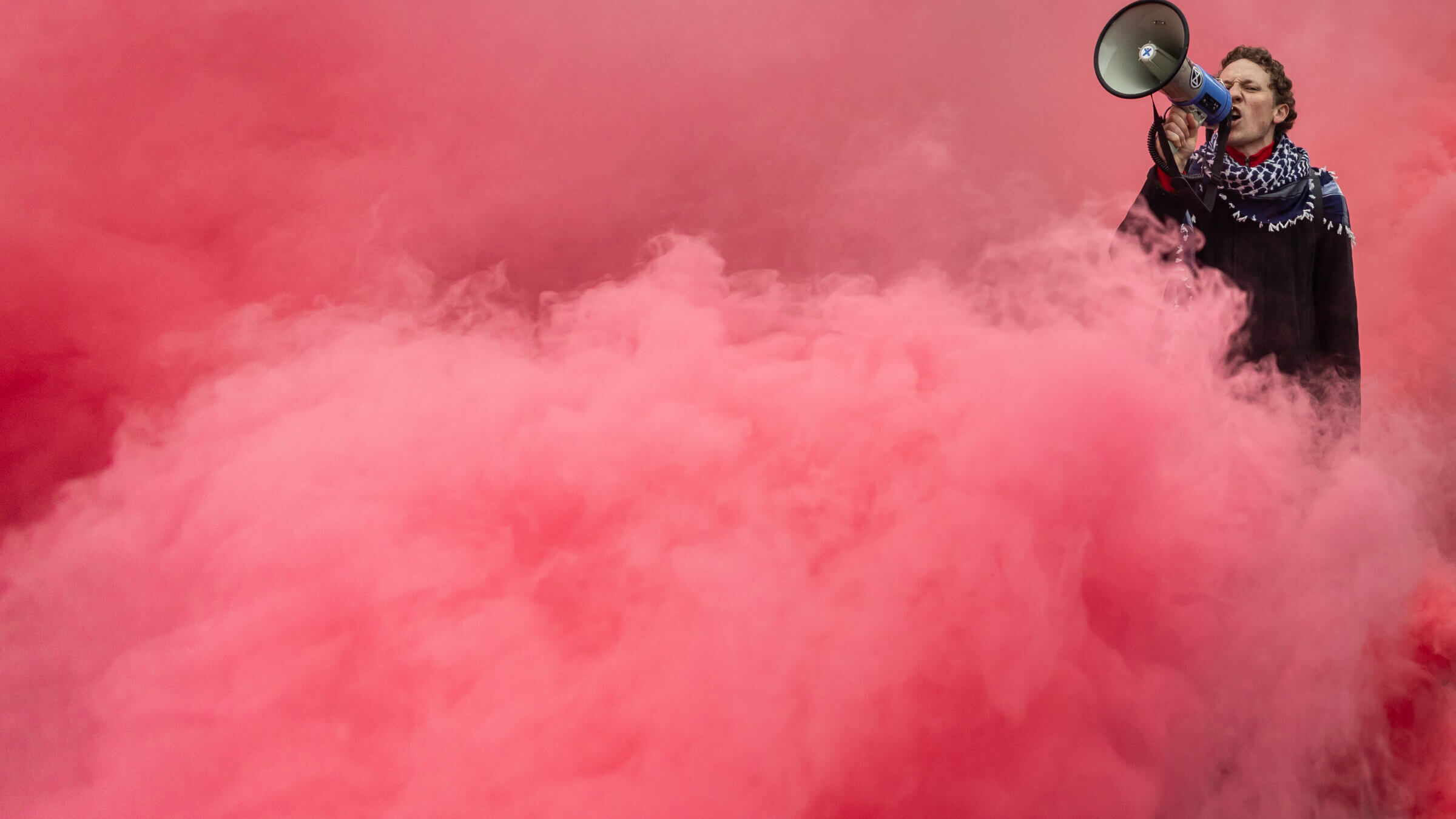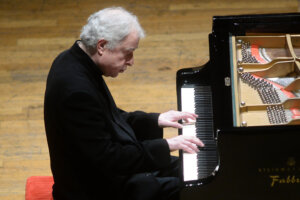Why a concert hall should be the last place for a protest — particularly an antisemitic one like this
A witless and bewildering protest of the Israel Philharmonic in Paris brought out the worst of the left and right

Flares like the ones used at a concert by Andras Schiff and the Israel Philharmonic have become common in protests, like this one in support of Palestinians in Warsaw, on Oct. 12, 2025. Photo by Wojtek Radwanski/AFP via Getty Images)
In the opening lines of his recently published memoir, the pianist Sir Andras Schiff, born to Hungarian-Jewish parents in 1953, writes, “To begin with there is silence, and music comes out of silence. Then comes the miracle of highly varied, progressive forms growing out of sounds and structures. After that, the silence returns.”
Yet at the start of Schiff’s rendition of Beethoven’s Fifth Piano Concerto with the Israel Philharmonic last week at the Cité de la Musique in Paris, music did not come out of silence. Instead, what came out of silence was the hiss of flares followed by gasps, shouts and insults when four members of the audience tried to interrupt the opening of the concerto.

According to an official communiqué from the Philharmonie de Paris, the protesters twice lit flares while walking towards the stage, trailing smoke and sparks behind them. Schiff and the conductor, Lahav Shani, left the stage, while several audience members confronted the protesters. Altercations quickly followed and all four protesters were soon removed by a security detail from the auditorium and subsequently arrested by the police.
Once calm had returned, Schiff and Shani returned to the stage and picked up again at the beginning of the Beethoven concerto. Not surprisingly, there soon followed reviews — not of the performance but of the protest. Political and public figures across the ideological spectrum did not hesitate to weigh in.
On the far right, Marine Le Pen, in her continuing effort to efface the antisemitic origins of her political party, the National Rally, quickly added her voice to the cacophony. “The incidents provoked last night by antisemitic activists on the extreme left could have turned into a tragedy.” Turning this tragedy into comedy, the daughter of Jean-Marie Le Pen warned on X that such “acts are intolerable and calls for an exemplary response from our courts.” (Le Pen continues to denounce, it should be noted, those same courts that recently found her guilty of the embezzlement of campaign funds.)
As for the extreme left, they turned the cacophony into what could only be called a kakaphony. In a television interview, a spokesperson for Defiant France, Manon Aubry, refused to condemn what she described as “incidents.” More tellingly, she then reminded listeners that the target of the protest “was not just any artist.” Instead, they were “artists who represent the Israeli state.”
Not to be outdone, the movement’s leader, Jean-Luc Mélenchon, acknowledged the situation had gotten “a bit out-of-hand.” But you cannot, he continued, prevent people from protesting a genocide. “One can regret last night’s incidents, but I regret the genocide more than the affaire at the Philharmonie. Mais voilà, that’s how it is. There are consequences for international actions.”
Mais non, that is not how it should be — especially, as Vladimir Jankélévitch would have added, at a concert hall. In 1961, this French-Jewish philosopher published La musique et l’ineffable, which was subsequently translated and published in 2003 as Music and the Ineffable. Though he did not have such political protests in mind, Jankélévitch’s explanation of the ineffability of music reveals why a concert hall should have been the last place for such a protest, especially one that reduces the playing of music to the policies of a government.
According to the online Oxford dictionary, “ineffable” can denote something which is unspeakable because it is too shocking or too ugly to be expressed. But this is not how Jankélévitch understood the word. He distinguishes between the untellable — namely, things that cannot be spoken of, like death, because “there is absolutely nothing to say” — and the ineffable, which cannot be explained because “there are infinite and interminable things to be said of it.”
What I think Jankélévitch means is a feeling familiar to many of us when we write or read or talk or even reflect on music. We are left wordless after listening, say, to the opening cadenza in Beethoven’s concerto, but we will insist on finding the words as we leave the concert hall.
And yet, writing about music is a weirdly futile exercise, one that Frank Zappa, it appears, compared to dancing about architecture. Both are equally nonsensical enterprises. Music exists on a plane where words are worse than useless; they always fail to convey what we feel while listening to the music.
This is why Jankélévitch would reject any attempt to find biographical meaning in the Fifth Piano Concerto, even though Beethoven composed the piece in Vienna in 1809, at the very moment that the French army under Napoleon was laying siege to the city. Beethoven had to take cover in the basement of his brother’s building, where the increasingly deaf composer shielded his ears with pillows from the constant bombardment from French cannons. Moreover, the authoritarian Napoleon represented the great threat to the ideal of liberty embraced by Beethoven.
Jankélévitch would also resist an effort to find historical parallels between now and then. If I, as a historian, suggested such a parallel — namely, that the concerto was composed in a context of war and death that resembles the experiences of war and death in Gaza — Jankélévitch would frown under his crown of silver hair. While music is a deeply meaningful experience, it is not, paradoxically, one that conveys a specific meaning, whether historical, moral or philosophical. And it is one that must be followed by silence.
All of this makes the protest at the concert hall not just witless and wanton, but also bewildering. The activists tried to deny a certain group from making music — the most meaningful of activities — because, as Israelis and/or Jews, they were held to be complicit in their government’s war without mercy in Gaza. Here lies the true ineffability. The clearly antisemitic action by these protesters was defended, on the extreme left, by leaders who have long been antisemitic-curious. To compound the ineffability of it all, the protesters were also denounced by the extreme right, which still carries the stink of antisemitism.
In a word, both extremes are guilty of the Oxford definition of ineffability. In the case of Mélenchon, his sentiments are too vile for words, just as Le Pen’s motives are equally vile. If only silence would fall over both extremes so that music can again be heard.














